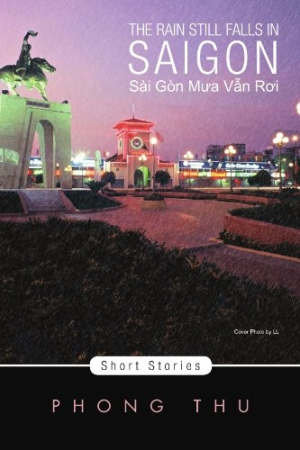The Rain Still Falls in Saigon
The end of the Vietnam conflict in 1975 brought a huge sigh of relief to Americans, but it marked the beginning of a stark upheaval for South Vietnam. In The Rain Still Falls in Saigon, writer Phong Thu delineates the changes that occurred after North Vietnam took over governing the south.
Thu’s short stories embrace people of all ages who experience conflict at key points in their lives. Much of the narrative focuses on government corruption, the brutal denial of the right to speak out, the breakdown of families, and the loss of hope within the citizenry. Her themes are accentuated by the collision between the Vietnamese who have left for the United States and other countries, and later returned to visit, and those who have stayed. The book is awash in memory, as characters reminisce about happier times before the takeover.
The stories include disturbing chronicles of child trafficking, false accusations leading to imprisonment, former lovers whose lives were altered when one of them left the country, and once self-sustaining land owners who had their property taken. Metaphorically and literally, Thu describes dead bodies floating in the river, the disappearance of fish, flowers, trees, and wildlife and the proliferation of overcrowding, hunger, and poverty. In “Fishing Under Full Moon,” she writes: “Dong thought, I am a fish lying on the cutting board. People want to cut, to slash, to bruise, to cook however they want. I should die and nobody paid attention.”
The seeds for a powerful narrative are certainly present, but Thu lacks command of the English language, which hinders the flow of the book. In “The Wandering Stars,” for instance, she writes that, “He tried to write the articles to advocate for probably right, contributed that it could help the social to be better for the country.” Yet in the third story, “Miss Saigon,” the writing is polished, as though translated by another person. Why Thu didn’t use a translator for the entire book is a mystery.
Thirteen of Thu’s stories are written in fractured English, and fourteen stories are written in Vietnamese. Unless one reads Vietnamese, it is impossible to tell whether or not each story is repeated.
There is a tendency to repeat statements in different stories about the poverty, corruption, and other widespread problems that were noted in the prologue. The narrative should address such issues through action and dialogue; instead, the reader is hit over the head with these themes in statement form.
Thu is a respected writer with more than thirty years of publishing credits, including Doa Phu Dung and The Girl Behind the Red Bougainvillea, and a children’s collection, The Bear Helps His Friend. Currently, she writes for many Vietnamese magazines and websites.
In its present form, without a polished translation, it is difficult to recommend The Rain Still Falls in Saigon, which is a shame because it would be valuable to understand what happened in Vietnam after the United States left the country and began to put our own national tragedy behind us.
Reviewed by
Joe Del Priore
Disclosure: This article is not an endorsement, but a review. The publisher of this book provided free copies of the book and paid a small fee to have their book reviewed by a professional reviewer. Foreword Reviews and Clarion Reviews make no guarantee that the publisher will receive a positive review. Foreword Magazine, Inc. is disclosing this in accordance with the Federal Trade Commission’s 16 CFR, Part 255.

